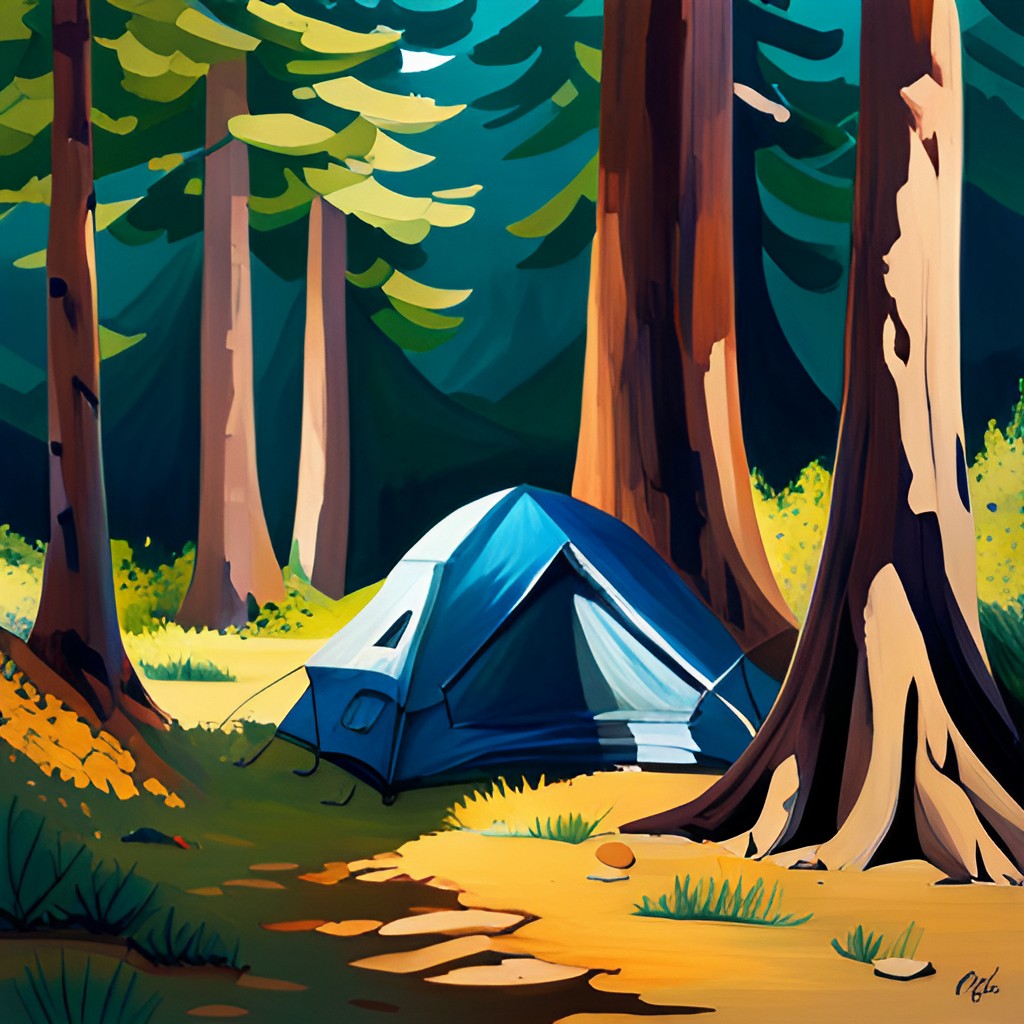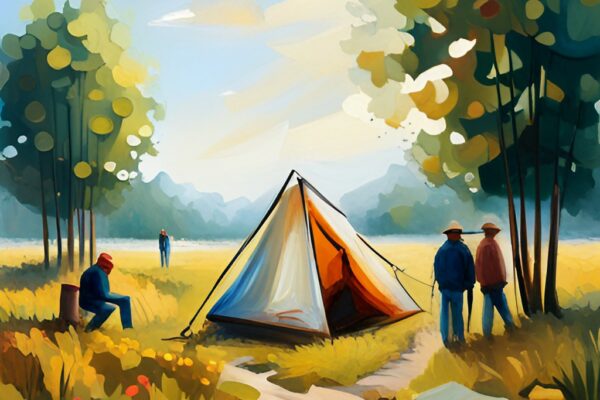
Planning a fun and memorable trip with kids requires careful consideration and preparation, but the rewards are countless. Engaging in outdoor activities like tent camping allows families to bond and provides children with valuable life experiences and a deep connection with nature.
In this comprehensive guide, we will explore the benefits of involving kids in outdoor activities, offer tips for choosing family-friendly campgrounds, discuss the ideal time of year for a memorable camping experience, and delve into strategies for managing challenges that may arise during the trip.
We will also provide insights on entertaining children with engaging and educational activities, managing meal planning and cooking, helping kids deal with homesickness, and teaching them to respect wildlife and their habitats.
We have included a section of frequently asked questions to address common queries. So, let’s dive in and discover how to plan a truly unforgettable family tent camping adventure!
What Are the Benefits of Involving Kids in Outdoor Activities Like Tent Camping?
Engaging children in outdoor activities such as tent camping can positively impact their physical, mental, and emotional well-being. By immersing themselves in nature and participating in the camping experience, kids can develop valuable life skills, create lasting memories, and foster a deeper connection with the natural world. Here are the benefits of involving kids in outdoor activities like tent camping in a detailed list format.
- What Are the Benefits of Involving Kids in Outdoor Activities Like Tent Camping?
- What Are the Essential Factors to Consider When Planning a Family Tent Camping Trip With Kids?
- How Can You Choose the Best Family-Friendly Campgrounds for a Memorable Tent Camping Experience?
- When Is the Ideal Time of Year to Plan a Family Tent Camping Trip for the Most Enjoyable Experience?
- Why Is Involve Children in a Family Tent Camping Trip Planning Process Important?
- What Are Some Engaging and Educational Activities to Keep Children Entertained During a Tent Camping Trip?
- How Can You Effectively Manage Meal Planning and Cooking While Camping With Kids in a Tent?
- What Are Some Effective Strategies for Handling Potential Challenges or Unexpected Situations While Camping With Kids?
- How Can Parents Help Their Kids Deal With Homesickness While Family Tent Camping?
- How Can Parents Teach Their Kids to Respect Wildlife and Their Habitats While Camping?
- Family Tent Camping: How to Plan a Fun and Memorable Trip With Kids – Frequently Asked Questions
- Family Tent Camping: How to Plan a Fun and Memorable Trip With Kids – Conclusion
- Family Tent Camping: How to Plan a Fun and Memorable Trip With Kids – Recommended Reading
Physical Health – Benefits of Involving Kids in Outdoor Activities Like Tent Camping
a. Physical Exercise: Tent camping involves various physical activities like hiking, biking, swimming, and exploring nature trails, which promote cardiovascular health, strength, and endurance.
b. Vitamin D Absorption: Spending time outdoors exposes children to natural sunlight, enabling their bodies to produce vitamin D, essential for bone health and overall immune system function.
Mental and Emotional Well-being – Benefits of Involving Kids in Outdoor Activities Like Tent Camping
a. Stress Reduction: Outdoor activities and being in nature have been proven to reduce stress levels in children, promoting better mental well-being and a sense of calmness.
b. Increased Happiness: Connecting with nature stimulates the release of endorphins, commonly known as “feel-good” hormones, leading to increased happiness and improved mood.
c. Enhanced Cognitive Abilities: Outdoor activities like tent camping encourage problem-solving skills, critical thinking, and creativity as children navigate their surroundings and adapt to new situations.
d. Improved Concentration: Exposure to natural environments has been shown to enhance attention span and focus, positively impacting academic performance and overall cognitive development.
Social Skills and Relationships – Benefits of Involving Kids in Outdoor Activities Like Tent Camping
a. Teamwork and Cooperation: Camping with family or friends provides opportunities for children to collaborate, share responsibilities, and work as a team, fostering critical social skills.
b. Communication and Bonding: Spending quality time together in nature strengthens family bonds, encourages open communication, and creates lasting memories that strengthen relationships.
c. Conflict Resolution: Tent camping can present challenges, and children learn to resolve conflicts, negotiate, and compromise, developing essential conflict resolution skills.
d. Empathy and Respect: Engaging with nature and wildlife teaches children to appreciate and respect the environment, instilling empathy and a sense of responsibility towards the natural world.
Environmental Awareness – Benefits of Involving Kids in Outdoor Activities Like Tent Camping
a. Conservation Education: Tent camping offers an ideal setting to educate children about the importance of preserving nature, promoting sustainable practices, and nurturing a sense of environmental stewardship.
b. Connection with Nature: By immersing themselves in natural surroundings, kids develop a deeper understanding of ecosystems, wildlife, and the interdependence of living organisms, fostering a sense of respect and care for the environment.
c. Environmental Advocacy: Engaging in outdoor activities like tent camping can inspire children to become advocates for environmental causes, encouraging them to take action to protect the planet.
What Are the Essential Factors to Consider When Planning a Family Tent Camping Trip With Kids?
Planning a family tent camping trip with kids can be exciting and memorable. However, to ensure a successful and enjoyable experience, several essential factors need to be considered. From safety and comfort to entertainment and organization, careful planning is crucial. Here are some key factors to remember when preparing for a family tent camping trip.
1. Destination Selection – Essential Factors to Consider When Planning a Family Tent Camping Trip With Kids
Choose a family-friendly campground that offers suitable facilities and amenities. Look for locations with well-maintained restrooms, showers, and possibly laundry facilities. Additionally, consider the proximity to activities such as hiking trails, fishing spots, or swimming areas to keep the kids entertained.
2. Weather Conditions – Essential Factors to Consider When Planning a Family Tent Camping Trip With Kids
Check the weather forecast for the duration of your trip. Pack appropriate clothing, including extra layers and rain gear, to ensure everyone stays comfortable in different weather conditions. Be prepared for sudden changes in temperature or unexpected rain showers.
3. Tent Size and Setup – Essential Factors to Consider When Planning a Family Tent Camping Trip With Kids
Select a tent that can comfortably accommodate the entire family. Opt for a larger tent with multiple compartments or a separate sleeping area to provide privacy and allow for better organization. Practice setting up the tent before the trip to avoid any difficulties or surprises at the campsite.
4. Safety Measures – Essential Factors to Consider When Planning a Family Tent Camping Trip With Kids
Prioritize safety by packing essential items such as a first aid kit, insect repellent, sunscreen, and a whistle for emergencies. Teach children about campground safety rules and potential hazards, such as campfire safety and wildlife encounters. Additionally, establish boundaries and set rules to ensure everyone knows the campsite’s safe areas.
5. Sleeping Arrangements – Essential Factors to Consider When Planning a Family Tent Camping Trip With Kids
Plan sleeping arrangements. Bring comfortable sleeping bags, extra blankets, and camping pillows to ensure a good night’s sleep. Consider air mattresses or sleeping pads for added comfort, especially for younger children or individuals with specific sleeping needs.
6. Meal Planning – Essential Factors to Consider When Planning a Family Tent Camping Trip With Kids
Create a menu and pack food accordingly. Opt for easy-to-prepare meals and snacks, considering everyone’s preferences and dietary restrictions. Remember that camping often involves limited refrigeration, so choose non-perishable and long-lasting food items. Don’t forget to bring utensils, plates, and cooking equipment suitable for campfire cooking or portable stoves.
7. Entertainment and Activities – Essential Factors to Consider When Planning a Family Tent Camping Trip With Kids
Keep the kids engaged by planning various outdoor activities and games. Bring sports equipment like frisbees, soccer balls, or badminton sets. Consider nature scavenger hunts, storytelling around the campfire, or stargazing activities. Encourage everyone to disconnect from electronic devices and enjoy the natural surroundings.
8. Packing Essentials – Essential Factors to Consider When Planning a Family Tent Camping Trip With Kids
Make a comprehensive checklist to ensure you don’t forget any essentials. Include items like camping gear (tent, sleeping bags, camping chairs), cooking supplies, clothing, toiletries, and personal items. Bringing a camping essentials toolkit with a flashlight, extra batteries, duct tape, and a multi-tool is also helpful.
9. Hygiene and Sanitation – Essential Factors to Consider When Planning a Family Tent Camping Trip With Kids
Maintain cleanliness and hygiene during the camping trip. Pack biodegradable soap, hand sanitizers, wet wipes, and garbage bags to dispose of waste properly. Teach children the importance of cleaning up after themselves and respecting the environment.
10. Flexibility and Relaxation – Essential Factors to Consider When Planning a Family Tent Camping Trip With Kids
Finally, remember that camping is about enjoying the outdoors and spending quality time together. Embrace the spirit of adventure and be flexible with your plans. Allow downtime to relax, appreciate nature, and create lasting memories with your family.
How Can You Choose the Best Family-Friendly Campgrounds for a Memorable Tent Camping Experience?
Choosing the best family-friendly campgrounds is crucial for creating a memorable tent camping experience. A well-selected campground can provide a safe and enjoyable environment with convenient amenities and activities for the whole family. Consider the following factors when searching for the perfect campground:
1. Location – Choosing the Best Family-Friendly Campgrounds
Look for campgrounds that are easily accessible and preferably within a reasonable distance from your home. Consider the travel time, especially when camping with young children with limited patience for long journeys.
2. Safety – Choosing the Best Family-Friendly Campgrounds
Prioritize safety by choosing campgrounds with well-maintained facilities and a good reputation for security. Check if the campground has proper lighting, clear signage, and a well-defined boundary. Additionally, inquire about any safety measures they have in place, such as lifeguards at swimming areas or rules regarding fire safety.
3. Amenities – Choosing the Best Family-Friendly Campgrounds
Consider the amenities offered by the campground. Look for clean and modern restroom facilities with showers and accessible water sources. Other desirable amenities may include picnic areas, playgrounds, campfire pits, and laundry facilities. These amenities can enhance comfort and convenience during your stay.
4. Campsite Size and Privacy – Choosing the Best Family-Friendly Campgrounds
Check the size of the campsites to ensure they can comfortably accommodate your family and tent. Look for sites with ample space between neighboring campers, allowing for privacy and minimizing noise disturbance. Some campgrounds offer secluded or premium sites with additional amenities or natural features.
5. Recreation and Activities – Choosing the Best Family-Friendly Campgrounds
Research the available recreational activities at the campground. Look for options that cater to various interests and age groups. This may include hiking trails, swimming or boating opportunities, fishing spots, nature programs, or organized activities for children. Having diverse recreational options ensures that everyone in the family can find something enjoyable to do.
6. Reviews and Recommendations – Choosing the Best Family-Friendly Campgrounds
Read online reviews and seek recommendations from other campers. Websites and forums dedicated to camping often provide insights into the experiences of previous visitors. Pay attention to reviews that mention family-friendly features or activities, as they can help you make an informed decision.
7. Policies and Rules – Choosing the Best Family-Friendly Campgrounds
Familiarize yourself with the campground’s policies and rules. Check if they have specific guidelines for quiet hours, pet policies, or restrictions on campfire usage. Understanding the rules beforehand will help you plan and ensure a smooth and respectful camping experience.
8. Surrounding Environment – Choosing the Best Family-Friendly Campgrounds
Consider the natural surroundings of the campground. Look for scenic views, proximity to nature trails, or access to nearby attractions like national parks, lakes, or beaches. The surrounding environment can significantly enhance the overall camping experience, providing opportunities for exploration and adventure.
9. Pet-Friendly Options – Choosing the Best Family-Friendly Campgrounds
Check if the campground is pet-friendly if you plan to bring your furry friend along. Look for designated pet areas, trails suitable for walking dogs, and any specific rules or restrictions regarding pets.
10. Reservation and Cost – Choosing the Best Family-Friendly Campgrounds
Finally, consider the reservation process and the associated costs. Determine if the campground requires reservations and how far in advance you need to book. Check the pricing structure, including any additional fees for amenities or activities. Comparing costs and availability can help you find the best value for your money.
Considering these factors, you can choose the best family-friendly campgrounds that align with your preferences and ensure a memorable tent camping experience for your entire family. Remember to plan and make early reservations, especially during peak camping seasons.
When Is the Ideal Time of Year to Plan a Family Tent Camping Trip for the Most Enjoyable Experience?
The ideal time of year to plan a family tent camping trip for the most enjoyable experience depends on various factors such as weather, availability, and personal preferences. However, there are a few key reasons to consider when aiming for optimal camping conditions. Here are some factors to keep in mind when selecting the ideal time for a family tent camping trip:
1. Spring – Ideal Time of Year to Plan a Family Tent Camping Trip
Spring is often considered an excellent time for camping, especially for families. The weather tends to be mild, with comfortable temperatures and blooming flora. It’s a great season for exploring nature, hiking, and enjoying outdoor activities. However, be aware that spring weather can be unpredictable, so pack extra layers and rain gear to prepare for possible showers.
2. Summer – Ideal Time of Year to Plan a Family Tent Camping Trip
Summer is a popular season for camping due to longer daylight hours and warmer temperatures. It offers various activities such as swimming, boating, fishing, and barbecues. Many families plan their camping trips during the summer break, making it an ideal time for kids to enjoy the outdoors. Remember that popular campgrounds may be crowded during this time, so making reservations well in advance is advisable.
3. Fall – Ideal Time of Year to Plan a Family Tent Camping Trip
Fall is a favorite season for many campers due to the beautiful foliage and cooler temperatures. The colors of the changing leaves create a stunning backdrop for outdoor adventures. The weather is typically mild, making hiking, biking, and exploring nature trails comfortable. Fall camping also offers the advantage of fewer crowds compared to the summer months.
4. Winter – Ideal Time of Year to Plan a Family Tent Camping Trip
Winter camping can provide a unique and adventurous experience for families who enjoy the cold weather. However, it requires careful preparation and consideration of safety measures. Winter camping is more suitable for experienced campers or families well-equipped for extreme temperatures and challenging conditions. It’s essential to have appropriate cold-weather gear, warm sleeping bags, and knowledge of winter camping techniques.
5. Weekdays vs. Weekends – Ideal Time of Year to Plan a Family Tent Camping Trip
Consider the timing of your camping trip in terms of weekdays versus weekends. Campgrounds tend to be busier on weekends, especially during peak seasons. If you prefer a quieter and less crowded experience, consider planning your trip for weekdays. This can provide a more tranquil atmosphere and availability for desired campsites or activities.
6. Local Events and Holidays – Ideal Time of Year to Plan a Family Tent Camping Trip
Be mindful of local events or holidays that may impact your camping trip. Some popular campgrounds may be fully booked or crowded during holiday weekends or special events. Check the local calendar and consider planning your trip accordingly to avoid any inconveniences.
7. Off-peak Seasons – Ideal Time of Year to Plan a Family Tent Camping Trip
Off-peak seasons can offer unique advantages for a family camping trip. Consider planning your trip just before or after the peak camping season to enjoy more solitude and potentially lower rates. However, be aware that some facilities or amenities may be limited or closed during these periods, so research campground availability and services in advance.
Ultimately, the ideal time for a family tent camping trip depends on your preferences, weather conditions, and availability. Consider the factors mentioned above, including the desired activities, local climate, and personal schedules, to choose a time that provides the most enjoyable experience for your family.
Why Is Involve Children in a Family Tent Camping Trip Planning Process Important?
Here are some key reasons why involving children in the planning process is beneficial:
1. Empowerment and Decision-Making Skills – Importance of Involving Children in a Family Tent Camping Trip Planning Process
Including children in the planning process empowers them and helps develop their decision-making skills. Giving them a voice and involving them in discussions about activities, destination choices, or meal planning allows them to express their opinions, make choices, and take responsibility for their decisions. This fosters confidence and a sense of ownership in the camping experience.
2. Education and Learning Opportunities – Importance of Involving Children in a Family Tent Camping Trip Planning Process
Planning a camping trip offers numerous educational opportunities for children. They can learn about different ecosystems, wildlife, and natural landmarks in the chosen destination. Researching camping gear, reading maps, and understanding camping etiquette can enhance their knowledge and practical skills. It also allows parents to teach their children about environmental conservation and outdoor safety, Leave No Trace principles.
3. Building Family Bonds – Importance of Involving Children in a Family Tent Camping Trip Planning Process
Involving children in the planning process strengthens family bonds and promotes teamwork. Collaborating on decisions, discussing preferences, and working together towards a shared goal fosters a sense of unity and strengthens communication within the family. It creates an atmosphere of togetherness and reinforces the idea that everyone’s opinions and contributions are valued.
4. Anticipation and Excitement – Importance of Involving Children in a Family Tent Camping Trip Planning Process
Including children in the planning process generates a sense of anticipation and excitement. It builds anticipation as they eagerly await the upcoming adventure and feel involved in the preparations. This anticipation can further enhance the overall experience, creating lasting memories and shared anticipation as a family.
5. Tailoring the Experience to Children’s Interests – Importance of Involving Children in a Family Tent Camping Trip Planning Process
When children are involved in the planning process, their interests and preferences can be considered. They can have a say in activities, such as choosing hiking trails, planning nature scavenger hunts, or deciding on games to play at the campsite. This tailored experience makes the camping trip more engaging and enjoyable for children, ensuring they have activities that align with their interests.
6. Teaching Responsibility and Organization – Importance of Involving Children in a Family Tent Camping Trip Planning Process
Planning a camping trip requires organization and responsibility. Involving children in tasks like packing lists, organizing camping gear, or preparing meals helps them develop these critical life skills. They learn to prioritize, manage their belongings, and contribute to the trip’s overall success. These skills will serve them well in other areas of their lives as they grow older.
9. Nurturing Nature Connection – Importance of Involving Children in a Family Tent Camping Trip Planning Process
When children are involved in planning a camping trip, they develop a deeper connection with nature. They better understand the environment, learn to appreciate the outdoors, and create a sense of responsibility towards the natural world. This connection can have a lasting impact, fostering a love for nature and environmental stewardship.
10. Enhancing Problem-Solving Skills – Importance of Involving Children in a Family Tent Camping Trip Planning Process
The planning process may involve overcoming challenges or unexpected situations. Involving children in problem-solving discussions allows them to contribute ideas and brainstorm solutions. This cultivates their critical thinking and problem-solving skills, teaching them to adapt to new situations and find creative solutions.
What Are Some Engaging and Educational Activities to Keep Children Entertained During a Tent Camping Trip?
It’s essential to have engaging and educational activities to keep them entertained and make the experience enjoyable for everyone. Here are some ideas for activities that can entertain and educate children during a camping trip:
1. Nature Scavenger Hunt – Engaging and Educational Activities to Keep Children Entertained During a Tent Camping Trip
Create a scavenger hunt list that includes items found in nature, such as specific leaves, rocks, or animal tracks. Children can explore the surroundings and try to find and collect the items on the list. This activity encourages observation skills, enhances knowledge of the natural environment, and adds an element of excitement to the camping experience.
2. Campfire Stories – Engaging and Educational Activities to Keep Children Entertained During a Tent Camping Trip
Gather around the campfire and take turns telling stories. Encourage children to use their imagination and create their own stories. You can also bring a book of campfire stories or folktales to read aloud. This activity promotes storytelling skills, sparks creativity, and creates a cozy and memorable atmosphere.
3. Stargazing – Engaging and Educational Activities to Keep Children Entertained During a Tent Camping Trip
On clear nights, take the opportunity to stargaze. Teach children about constellations and point out different stars and planets. Use a stargazing app or a star chart to identify and learn about celestial objects. This activity provides a sense of wonder and instills an appreciation for the vastness of the universe.
4. Nature Crafts – Engaging and Educational Activities to Keep Children Entertained During a Tent Camping Trip
Collect natural materials like leaves, pinecones, or stones and use them to create nature-inspired crafts. Children can make leaf rubbings, create artwork with found objects, or make jewelry using shells or acorns. This activity encourages creativity, resourcefulness, and an appreciation for the beauty of nature.
5. Outdoor Games – Engaging and Educational Activities to Keep Children Entertained During a Tent Camping Trip
Bring along outdoor games that can be played at the campsite. Classics like frisbee, badminton, or a ball game can keep children active and entertained. Consider games that can be adapted to the camping environment, such as a nature-themed scavenger hunt relay or a campsite obstacle course. These games promote physical activity, cooperation, and friendly competition.
6. Nature Journaling – Engaging and Educational Activities to Keep Children Entertained During a Tent Camping Trip
Encourage children to keep a nature journal during the camping trip. Provide them with sketchbooks or notebooks where they can document their observations, draw plants or animals they encounter, or write about their experiences. This activity enhances observation skills, creativity, and writing while fostering a deeper connection with the natural world.
7. Hiking and Nature Walks – Engaging and Educational Activities to Keep Children Entertained During a Tent Camping Trip
Explore the nearby trails or nature paths with your children. Take leisurely hikes or nature walks, pointing out interesting plants, wildlife, or geological formations. Discuss the importance of conservation and respect for the environment. Physical activity while appreciating nature’s beauty provides educational and health benefits.
8. Outdoor Cooking – Engaging and Educational Activities to Keep Children Entertained During a Tent Camping Trip
Involve children in the cooking process by preparing meals or snacks together. Let them assist in gathering firewood, lighting the campfire (with supervision), or preparing simple campfire recipes. This hands-on activity teaches basic cooking skills, promotes self-sufficiency, and encourages an appreciation for food and the effort it takes to prepare it.
9. Leave No Trace Activities – Engaging and Educational Activities to Keep Children Entertained During a Tent Camping Trip
Teach children about Leave No Trace principles and engage them in activities that promote environmental stewardship. Encourage them to pick up litter around the campsite or participate in a group clean-up. Discuss the importance of respecting nature and leaving the camp in better condition than when you arrived.
10. Nature Photography – Engaging and Educational Activities to Keep Children Entertained During a Tent Camping Trip
Provide children with disposable cameras or let them use a smartphone (under supervision) to capture their camping experience through photography. Encourage them to take pictures of interesting plants, animals, or scenic views. This activity cultivates an artistic eye, enhances observation skills, and creates a visual memory of the camping trip.
How Can You Effectively Manage Meal Planning and Cooking While Camping With Kids in a Tent?
Managing meal planning and cooking while camping with kids in a tent requires some preparation and organization. Here are some tips to effectively handle meal planning and cooking during your camping trip:
1. Plan Ahead – Meal Planning and Cooking While Camping With Kids
Before your trip, plan your meals and create a menu. Consider the duration of your camping trip, the number of meals you’ll need to prepare, and your family’s dietary preferences or restrictions. Make a shopping list of the ingredients you’ll need for each meal.
2. Keep it Simple – Meal Planning and Cooking While Camping With Kids
Opt for simple and easy-to-prepare meals while camping. Choose recipes that require minimal cooking time and use ingredients that are easy to store and transport. One-pot meals, foil packet dinners, and pre-prepared snacks can be convenient options. Pack essential cooking utensils and equipment, such as a portable stove, pots, and pans.
3. Pre-Cut and Pre-Measure Ingredients – Meal Planning and Cooking While Camping With Kids
Pre-cutting and pre-measuring ingredients before your camping trip can save time and make meal preparation easier at the campsite. Prepare vegetables, fruits, and other ingredients in advance and store them in sealed containers or bags for easy access.
4. Use Ziplock Bags for Storage – Meal Planning and Cooking While Camping With Kids
Ziplock bags are versatile and handy for camping. Use them to store pre-cut ingredients, marinate meat, or organize smaller items like spices. They can help keep your food fresh, organized, and easily transported.
5. Pack Non-Perishable and Shelf-Stable Foods – Meal Planning and Cooking While Camping With Kids
Choose non-perishable and shelf-stable foods that can withstand the camping environment. Canned foods, dried fruits, nuts, granola bars, instant oatmeal, and dehydrated meals are good options. These foods require minimal refrigeration and can be easily stored in your camping supplies.
6. Involve Kids in Meal Preparation – Meal Planning and Cooking While Camping With Kids
Engage your kids in meal preparation and cooking. Assign age-appropriate tasks such as washing vegetables, mixing ingredients, or setting the table. Involving them teaches them valuable skills and makes them feel involved and excited about the camping experience.
7. Pack Easy-to-Clean Cookware – Meal Planning and Cooking While Camping With Kids
Opt for cookware that is easy to clean while camping. Non-stick pans, stainless steel pots, and cooking utensils with heat-resistant handles are practical choices. Consider bringing biodegradable dish soap and a sponge for cleaning dishes and utensils efficiently.
8. Plan for Snacks – Meal Planning and Cooking While Camping With Kids
Don’t forget to pack a variety of snacks for your kids. Trail mix, dried fruit, granola bars, and individual snack packs are convenient and portable options. Snacks can help keep hunger at bay between meals and provide energy for outdoor activities.
9. Consider Campfire Cooking – Meal Planning and Cooking While Camping With Kids
Embrace the campfire cooking experience by planning meals that can be cooked over the fire. This can include hot dogs, foil-wrapped vegetables or potatoes, or s’mores for a sweet treat. Ensure you follow proper fire safety guidelines and have the necessary tools for cooking over an open flame.
10. Clean Up Properly – Meal Planning and Cooking While Camping With Kids
After each meal, practice good hygiene and clean up the cooking area. Dispose of food waste properly and store leftover food securely to prevent attracting wildlife. Leave the campsite as clean as you found it, following Leave No Trace principles.
What Are Some Effective Strategies for Handling Potential Challenges or Unexpected Situations While Camping With Kids?
Here are some effective strategies for handling those situations:
1. Be Prepared – Effective Strategies for Handling Potential Challenges
Before your camping trip, research the area and weather conditions, and pack accordingly. Bring extra clothing, blankets, and rain gear, and make sure you have a first aid kit, flashlights, and plenty of water.
2. Communicate Clearly – Effective Strategies for Handling Potential Challenges
Communicate your expectations and safety guidelines to your children. Establish rules for the campsite, such as staying within designated areas, and make sure everyone understands them.
3. Have a Backup Plan – Effective Strategies for Handling Potential Challenges
Prepare a backup plan in case of unexpected weather conditions or other situations. Consider nearby activities or attractions you can visit if the weather turns bad or someone gets sick or injured.
4. Bring Entertainment – Effective Strategies for Handling Potential Challenges
Pack books, games, and other forms of entertainment to keep kids occupied during downtime. Encourage them to explore the campsite, play games, or go on a nature walk.
5. Stay Organized – Effective Strategies for Handling Potential Challenges
Keep your campsite organized and tidy to minimize the risk of accidents. Store food securely to prevent attracting wildlife, and keep cooking utensils and equipment clean.
6. Practice Fire Safety – Effective Strategies for Handling Potential Challenges
Ensure everyone understands fire safety principles and follows proper guidelines for building and maintaining fires. Keep a bucket of water or sand nearby in case of an emergency.
7. Stay Aware of Surroundings – Effective Strategies for Handling Potential Challenges
Keep an eye on your surroundings, and be aware of potential hazards such as steep drops, rocks, and wildlife. Teach children how to identify and avoid potential dangers.
8. Stay Calm – Effective Strategies for Handling Potential Challenges
In an emergency, stay calm and respond quickly. Have a plan for contacting emergency services, and make sure everyone knows what to do in an emergency.
9. Be Flexible – Effective Strategies for Handling Potential Challenges
Be prepared to adjust your plans if necessary. Sometimes unexpected situations can arise, and flexibility and adaptability are essential.
How Can Parents Help Their Kids Deal With Homesickness While Family Tent Camping?
Here are some strategies to help children cope with homesickness during family tent camping:
1. Prepare in Advance – Parents Help Their Kids Deal With Homesickness While Family Tent Camping
Before the camping trip, have open and honest conversations with your children about the possibility of feeling homesick. Let them know that it is normal and reassure them that you will be there to support them.
2. Familiarize with the Camping Environment – Parents Help Their Kids Deal With Homesickness While Family Tent Camping
Involve your children in planning and provide them with information about the camping destination. Show them pictures, videos, or guidebooks to help them visualize the campsite. This can create a sense of familiarity and excitement about the new environment.
3. Bring Comfort Items from Home – Parents Help Their Kids Deal With Homesickness While Family Tent Camping
Allow your children to bring comfort items from home, such as a favorite stuffed animal, blanket, or family photo. These familiar objects can provide a sense of security and help alleviate homesickness.
4. Establish a Routine – Parents Help Their Kids Deal With Homesickness While Family Tent Camping
Creating a routine during the camping trip can help children feel more secure and grounded. Set regular mealtimes, bedtime rituals, and activity schedules to provide structure and familiarity. Routines can create a sense of normalcy and make the camping experience feel more like home.
5. Encourage Communication – Parents Help Their Kids Deal With Homesickness While Family Tent Camping
Encourage your children to openly express their feelings and talk about their homesickness. Create a safe space for them to share their emotions without judgment. Listen actively and validate their feelings. Assure them it is normal to miss home and that it will gradually get more manageable.
6. Stay Engaged and Distracted – Parents Help Their Kids Deal With Homesickness While Family Tent Camping
Keep your children engaged in activities and distractions to help take their minds off homesickness. Plan fun and exciting activities like hiking, swimming, or nature exploration. Encourage them to interact with other campers, make new friends, and participate in group games or campfire activities.
How Can Parents Teach Their Kids to Respect Wildlife and Their Habitats While Camping?
Teaching children to respect wildlife and their habitats while camping is essential for fostering a sense of environmental responsibility and conservation. Here are some strategies parents can use to educate their kids about respecting wildlife and their habitats during camping trips:
1. Lead by Example – Teaching Kids to Respect Wildlife and Their Habitats While Camping
As a parent, demonstrate respectful behavior towards wildlife and their habitats. Show your children how to observe from a distance without disturbing or approaching animals. Avoid feeding or attempting to touch wild animals, and always follow local guidelines and regulations.
2. Educate About Wildlife – Teaching Kids to Respect Wildlife and Their Habitats While Camping
Take the time to educate your children about the wildlife they may encounter while camping. Teach them about different species, their behaviors, and their importance in the ecosystem. Help children develop an appreciation for the beauty and diversity of wildlife.
3. Emphasize the Importance of Habitat – Teaching Kids to Respect Wildlife and Their Habitats While Camping
Explain to your children the significance of preserving and protecting wildlife habitats. Discuss how habitats provide food, shelter, and breeding grounds for animals. Encourage them to see themselves as stewards of these habitats and explain the impact human actions can have on them.
4. Practice Leave No Trace Principles – Teaching Kids to Respect Wildlife and Their Habitats While Camping
Teach your children the principles of Leave No Trace, which promote responsible outdoor ethics. Encourage them to minimize their impact on the environment, including wildlife habitats. Teach them to properly dispose of waste, avoid damaging vegetation, and respect natural features.
5. Encourage Observation and Appreciation – Teaching Kids to Respect Wildlife and Their Habitats While Camping
Teach children to observe wildlife from a distance using binoculars or quiet observation. Encourage them to appreciate animals’ natural behaviors and their unique qualities. Foster a sense of awe and wonder for the natural world.
6. Use Field Guides and Books – Teaching Kids to Respect Wildlife and Their Habitats While Camping
Bring along field guides or books about local wildlife. Help children identify and learn more about the animals they encounter. Encourage them to ask questions and discuss the nature they observe.
7. Discuss Ethical Photography – Teaching Kids to Respect Wildlife and Their Habitats While Camping
If your children enjoy photography, teach them about ethical wildlife photography. Emphasize the importance of not disturbing or altering the behavior of animals for the sake of capturing a photo. Teach them to respect the animal’s space and prioritize the subject’s well-being.
8. Engage in Citizen Science – Teaching Kids to Respect Wildlife and Their Habitats While Camping
Consider participating in citizen science initiatives that involve observing and recording wildlife. Help your children understand the value of collecting data for scientific research and conservation efforts. It can be an exciting way to contribute to understanding and preserving wildlife.
9. Support Local Conservation Efforts – Teaching Kids to Respect Wildlife and Their Habitats While Camping
Research local conservation organizations or initiatives and involve your children in supporting them. Participate in community cleanups, tree planting projects, or fundraisers for wildlife conservation. Show your children the importance of taking active steps to protect wildlife and their habitats.
10. Encourage Responsible Behavior – Teaching Kids to Respect Wildlife and Their Habitats While Camping
Teach your children to respect boundaries and follow guidelines set by park rangers or wildlife authorities. Discourage behaviors such as feeding animals, chasing them, or disturbing their habitats. Help them understand that responsible behavior contributes to the well-being of wildlife.
Family Tent Camping: How to Plan a Fun and Memorable Trip With Kids – Frequently Asked Questions
Do You Think It Is Good for Children to Go Camping?
Yes, it is beneficial for children to go camping. Camping provides numerous opportunities for children to learn and grow in a natural and outdoor environment. It offers them a chance to connect with nature, develop essential life skills, and foster a sense of adventure and exploration.
Camping allows children to disconnect from screens and technology, promoting physical activity and engaging them in hands-on experiences. It encourages problem-solving, teamwork, and resilience as they navigate challenges in a new setting. Additionally, camping helps children develop an appreciation for the environment and wildlife, instilling a sense of responsibility for conservation.
What Age Is It Safe to Take a Kid Camping?
The age at which it is safe to take a child camping depends on various factors, such as the child’s maturity, physical capabilities, and level of supervision.
Generally, children as young as toddlers can accompany their families on camping trips, but parents should consider the child’s readiness for outdoor experiences and adapt the camping activities accordingly.
It is essential to prioritize safety by ensuring appropriate gear, weather conditions, and a safe camping environment. Parents should assess their child’s abilities and comfort level and provide close supervision, especially for younger children.
What Temperature Is Safe for Kids to Camp?
The safe temperature for kids to camp depends on various factors such as age, individual health, and the camping gear available. Generally, it is safe for kids to camp in temperatures above 50°F (10°C), provided they have appropriate clothing and shelter. It is vital to ensure the child is dressed in layers of clothing to regulate body temperature and prevent heat loss.
Parents should also ensure that the child has access to adequate shelter and bedding to keep warm during colder nights. Additionally, monitoring the child’s health and well-being during the camping trip is essential, especially if they exhibit discomfort or illness due to extreme temperatures. Parents should prioritize their child’s safety and comfort when planning a camping trip in various temperature conditions.
Family Tent Camping: How to Plan a Fun and Memorable Trip With Kids – Conclusion
Family tent camping can be a fun and memorable experience for parents and children. By involving kids in the planning process, choosing a family-friendly campground, and engaging them in educational and entertaining activities, parents can create an unforgettable camping adventure that strengthens family bonds and fosters a love for nature.
While unexpected situations may arise during the trip, effective management strategies can help parents navigate any challenges that come their way. Also, teaching kids to respect wildlife and their habitats can instill a sense of environmental responsibility.
Finally, it is essential to remember that camping with kids requires careful consideration of factors like age, temperature, and individual health needs. Overall, with careful planning and preparation, family tent camping can be an enriching experience that creates cherished memories for years.
Family Tent Camping: How to Plan a Fun and Memorable Trip With Kids – Recommended Reading
How Many Trips Can You Take With An Isobutane Fuel Canister? – Fueling Your Adventure
10 Delicious and Easy Vegan Camping Meals to Satisfy Your Outdoor Appetite
Eco-Friendly Tent Camping – 8 Important Tips for Leaving No Trace and Protecting the Environment














